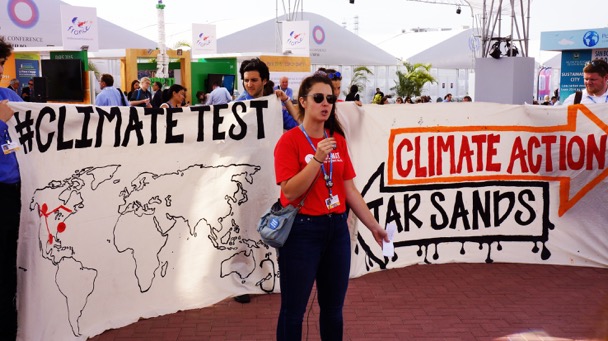Criticize the lack of free speech at UNFCCC meetings, which prevented direct mention of Kerry or Keystone XL
Lima, Peru – While US Secretary of State John Kerry spoke at the COP20 Climate Talks in Lima this afternoon, Canadian and US youth delegates hosted a tar sands protest outside the pavilion. Their messages was clear: the Obama Administration must reject the Keystone XL pipeline if it hopes to maintain any credibility at the climate talks.
“We’ve delayed Keystone for six years now and every delay is a step towards climate justice, but we have not won until we keep the tar sands in the ground. The best way the US can support progress in the UN Climate Talks is to start at home by rejecting the Keystone XL pipeline now,” said Dyanna Jaye, US Youth Delegate with SustainUS who helped to organize the action at COP 20.

While Secretary Kerry did not mention the pipeline by name, he made a compelling case for climate action and the need to apply a “precautionary principle” to energy decisions. He also called on developing countries to turn away from coal and oil, and towards clean energy–advice that would sound hypocritical if the US went ahead and approved Keystone XL, a pipeline that would transport 800,000 barrels a day of the tar sands oil, the dirtiest fuel on the planet.
“Our country has the opportunity to show that we are serious about tackling climate change. We, as youth, have the opportunity to make sure it happens,” said Natalie Lucas, Sierra Student Coalition U.S. Delegation Co-Chair, who also attended the rally.
The youth activists received permission from the UNFCCC to host their demonstration, but were banned from mentioning either the Keystone XL pipeline or Secretary Kerry by name.
“Earlier in the week, we held protests that called out specific countries and fossil fuel projects as bad actors in the negotiations and the broader fight against climate change,” said Evan Weber of U.S. Climate Plan. “Once we approached the Secretariat with a specific proposal around Kerry, the United States, and Keystone XL, suddenly this type of action was not allowed.”
“It’s outrageous that the United Nations censors participants’ protests from using anything that might identify a specific proposal when it’s politically inconvenient for that story to be shared,” said Alyssa Johnson-Kurts, a U.S. youth delegate with SustainUS.
It appears that the UNFCCC protocol is to approve actions on a case-by-case basis, without a clear set of guidelines for civil society groups about what is acceptable and what is forbidden. The “Fossil of the Day” award, for instance, highlights individual countries for their bad behavior at the talks, awarding them a fake prize for obstructing progress. Actions targeting individual companies and parts of the text have also been permitted. Organizers of today’s tar sands action found out about the new restrictions being placed on their event just hours before it took place.
“When we leave tomorrow we’ll take the fight home, where our voices can be heard in full, and where we have real and growing power,” said Johnson-Kurts.
“Dirty fossil fuel projects like Keystone XL clearly fail the climate test. We’ll be drawing the line on any new fossil fuel infrastructure and calling for investment in renewable energy solutions,” said Weber.
###
Contact:
In Lima: Collin Rees, [email protected], +51 991 121 627 (Lima mobile)
In U.S.: Hayden Higgins, [email protected]